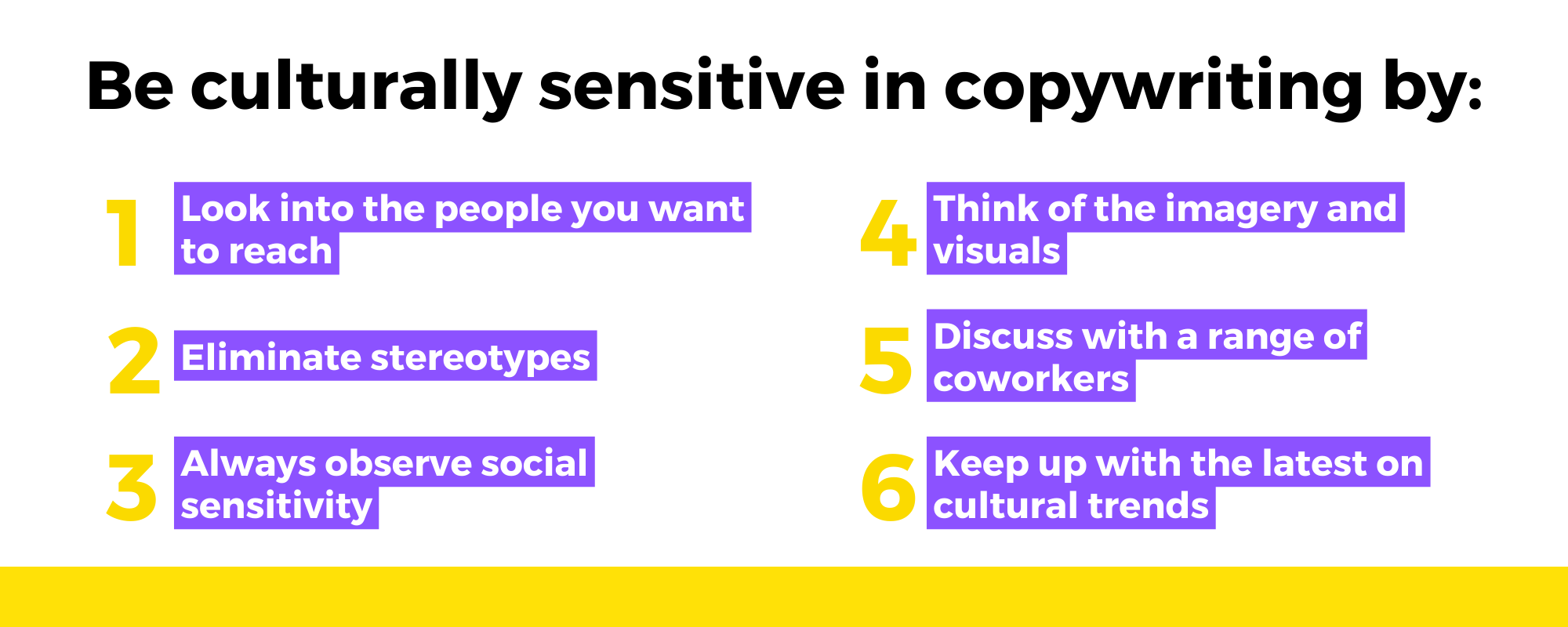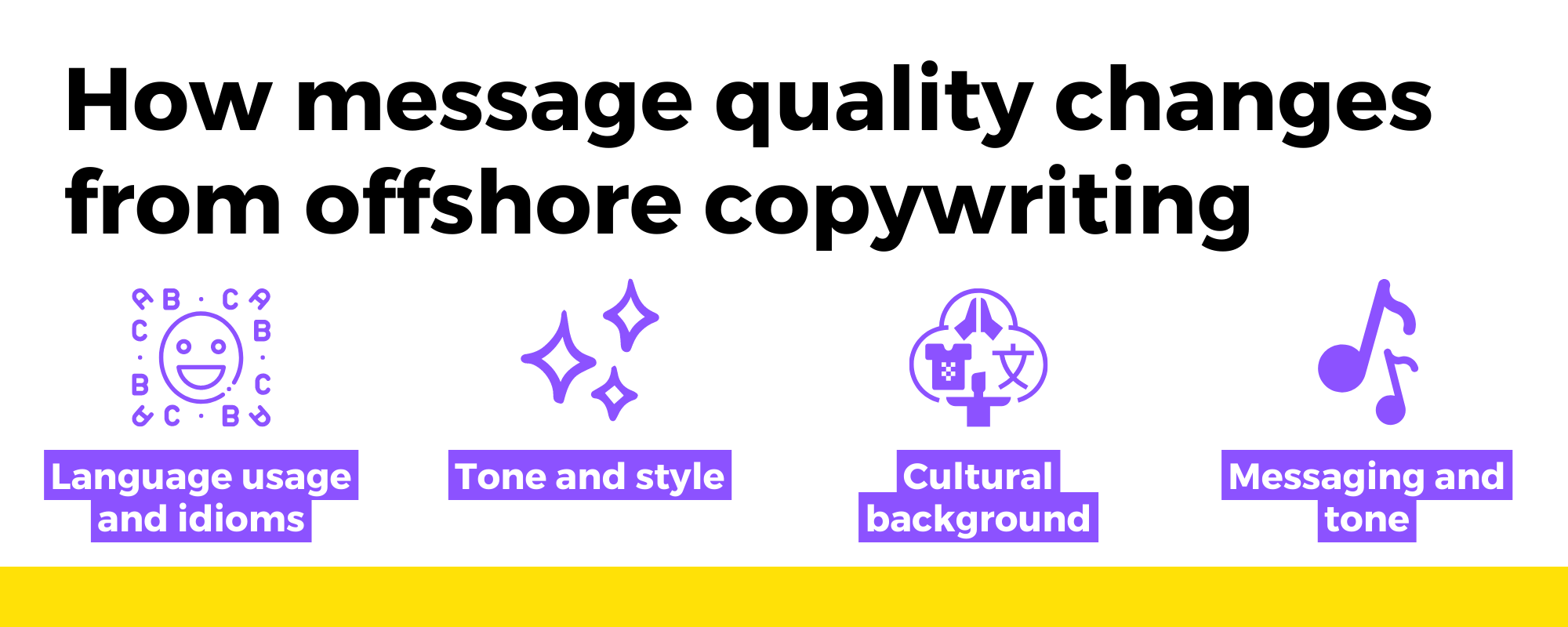Copywriting is a crucial aspect of marketing, and cultural differences can have a significant impact on its effectiveness. Tone-deaf content isn’t acceptable, and shouldn’t be published at all because they can negatively affect brands.
In today’s global economy, businesses are always searching for ways to improve their bottom line and stay competitive. One popular method is offshoring, which involves outsourcing specific business operations to firms or individuals in other countries.
Offshoring copywriting can be especially beneficial for companies due to the demand for high-quality content in digital marketing.
By outsourcing to qualified writers from around the world, businesses can create effective copy that appeals to their target market while saving money on labor expenditures.
Cultural differences can have a significant impact on the copywriting industry, and offshoring provides an efficient solution for accessing global talent.
Cultural Differences in Copywriting
Copywriting must take into account cultural differences since they might affect how consumers perceive and react to marketing messaging.
To make sure that their material is efficient and suitable for their target audience, copywriters need to be aware of these variances.
Language, habits, values, ideas, and social conventions are only a few examples of cultural variations.
Language differences
Among all the cultural variables that might affect copywriting, language variations are the most visible.
Understanding the cultural variations in audiences’ responses to sales presentations and commercials is crucial for copywriters. The difference between British and American audiences is one of the most obvious ones.
Spelling, grammar, and vocabulary can change greatly between nations, even those that speak the same language, like the US and the UK. For instance, the word “vacation” is frequently used in the US, although “holiday” is favored in the UK.
The majority of the time, American advertising is more overt and forceful. Marketers use a “hard sell” strategy, offering the goods right away and hyping it up to convince potential buyers.
The advantages of the good or service are heavily emphasized, frequently in an overt or confrontational way.
The art of selling is celebrated in America, where copywriters are expected to use their persuasion abilities to portray highly valuable goods or services to customers.
Although it might not be as imaginative as some other approaches, this strategy can be very successful at picking attention and ultimately boosting sales.
To create effective messaging that connects with your target audience, copywriters must have a thorough awareness of the subtle differences between various advertising strategies.
Humor
Humor is very subjective and can vary greatly based on societal conventions, cultural background, and personal preferences.
In one culture, something that is amusing or acceptable could not be in another. Hence, in order to avoid insulting their target audience, copywriters must be aware of the variances in cultural humor.
An Eastern joke, for instance, might not be as hilarious to Westerners who are used to Western humor. In contrast to the East, where humor is more likely to use puns, wordplay, and visual jokes, the West frequently bases humor on sarcasm, irony, or creative wordplay.
Idioms and everyday language are another key factor to take into account. These idioms may be difficult to translate into other languages because they are frequently unique to a particular area or culture.
A copywriter must take care not to utilize idioms that the target audience might not understand.
Also, cultural sensitivities must be considered, and offensive humor should be avoided. For instance, it may be considered disrespectful in some cultures to make fun of politics, religion, or social standing.
Values and beliefs
Values and beliefs are other cultural variations that might have an impact on copywriting. For instance, some cultures respect individualism while others favor collectivism.
The tone and messaging of copywriting may be impacted by these cultural variances. An uninformed copywriter risks unintentionally offending or alienating their audience by failing to understand the values and beliefs of a given culture.
For example, individualism is a cultural concept highly ingrained in the United States that has a significant impact on copywriting.
People are urged to appreciate their own success and accomplishments, which is frequently mirrored in copywriting that highlights a product or service’s advantages for the individual user.
Copywriters might employ language that emphasizes the special benefits a product delivers, emphasizing how it might assist the user stand out or get an advantage over others.
As Americans respect concise, clear communication, American copywriting also tends to be straightforward and direct.
Meanwhile, collectivism is a cultural characteristic that has a big influence on copywriting in Japan. In Japanese culture, communal well being and interpersonal peace are highly valued.
This may be seen in Japanese copywriting, which frequently places more emphasis on the advantages a good or service can provide for the collective than for the individual.
Copywriters may employ language that emphasizes how a product might advance the common good or unite people.
Although direct communication might be perceived as confrontational or impolite in Japanese culture, Japanese copywriting likewise tends to be more delicate and indirect.
How these differences can affect the message and effectiveness of copywriting
The message and effectiveness of copywriting can be significantly impacted by language barriers, humor, morals, and beliefs. Writing copy entails creating messages that are intriguing and convincing that appeal to the target audience.
Nonetheless, the message might not be effective if the audience has trouble understanding the copy’s language. Language barriers may lead to misunderstandings or confusion, which would impact conversion rates and decrease engagement.
Another element that can impact copywriting effectiveness is humor.
While comedy can be a useful strategy for grabbing the audience’s attention and helping the message stick in their minds, it can also backfire if it is inappropriate for the audience or comes across as insensitive.
To guarantee that the humor is well-received, it’s a key factor for copywriters to comprehend the cultural norms and values of the target audience.
Offshoring Copywriting and Cultural Differences
Offshoring copywriting can highlight cultural disparities as different writers’ perspectives on messaging and tone may come from different backgrounds. A copywriter based in the United States, for instance, would approach writing from a different cultural perspective than one based in India or the Philippines.
While cultural variations might enhance the copywriting process, if not managed appropriately, they can also result in misunderstandings and poor communication.
To ensure that messaging is sensitive to the intended audience and appropriate for their culture, it is crucial for the offshore team and the client to be aware of these differences and collaborate.
For businesses
As a copywriting client, you should be clear about the brand voice and intended audience when briefing an offshore copywriter or team. This includes being aware of and conveying any cultural quirks that might influence the messaging and tone of the copy.
If the audience is American but the brand is British, for instance, the text should reflect that restraint rather than overtly adopting an American tone. This calls for a thorough awareness of the target market in addition to a clear understanding of the brand’s values, personality, and uniqueness.
It helps if you prepare the brand style and language guide, or at least communicate it clearly. Using any pertinent cultural allusions or idioms is part of this, as is giving examples of successful brands or messaging that are similar to your own.
On copywriters
Understanding your target audience and the industry you work in is essential for copywriters. This calls for knowledge of both their industry-specific jargon and their country culture.
You need to be able to speak this industry and culture clearly and adjust your message to fit the brand’s and audience’s particular requirements and preferences.
To get to know the target audience, a copywriter should undertake extensive research on their demographics, behaviors, and interests.
Surveys, interviews, social media monitoring, and website analytics can all be used for this.
The audience’s motives, problems, and preferences can be better understood by examining this data.
How cultural differences can impact the quality of offshored copywriting
Language usage and idioms
Cultural differences can impact the caliber of copywriting, particularly in terms of language usage and idioms. Other cultures may have different ways of expressing themselves or using idioms that are unfamiliar to the target audience, resulting in ineffective or confusing content.
Tone and style
The tone and style of copywriting can also be affected by cultural differences. Other cultures may have different preferences in terms of formality, humor, or persuasion, which may not resonate with the target audience.
Cultural background and reference variations
Cultural background and reference variations can also have an impact on the quality of offshored copywriting. Copywriters from other cultures may have different frames of reference and cultural knowledge, resulting in ineffective or unsuitable content that does not resonate with the target audience.
Messaging and tone
Cultural variations in values and beliefs can also impact the messaging and tone of copywriting, resulting in misunderstandings or miscommunications.
Strategies to manage cultural differences
Handling cultural differences is essential for creating compelling copy that appeals to the intended audience.
1. Training on cultural awareness
Offshored copywriters can better comprehend the cultural quirks and preferences of the target audience by receiving cultural awareness training. Online courses, webinars, or live training sessions can all be used for this.
Copywriters can create material that is better suited for the target audience by becoming more culturally aware.
2. Communicating and receiving feedback
It can be easier to resolve any cultural differences and guarantee that the material created fits the expectations and demands of the target audience by regularly providing feedback and communicating to offshore copywriters.
Regular check-ins, video conferences, or messaging services can be used for this.
3. Collaborative methods
Working with offshore copywriters can promote a courteous and cooperative working environment. To do this, you must value their opinions and suggestions and involve them in the copywriting process.
Offshored copywriters can collaborate to create high-quality material that satisfies the demands of the target audience.
4. Localization services
Making use of localization services helps ensure that the written material is translated and customized to the target audience’s language, culture, and tastes.
Idioms and expressions may need to be translated, the tone and style modified, and the substance may need to be adjusted to reflect cultural norms.
Cultural Sensitivity
Cultural sensitivity is a vital idea in the field of copywriting that cannot be ignored.
In its purest form, cultural sensitivity is defined as having a profound grasp of and respect for the customs, beliefs, values, and conventions of a particular group of people.
It calls for writers to be aware of the potential effects of their words on various audiences and to steer clear of any language or imagery that can offend or turn them off.
Why cultural sensitivity matters in copywriting
Writing with cultural sensitivity is crucial since it ensures that the text is courteous and suitable for the intended audience.
The goal of copywriting is to convince and connect with readers, but if it is not written with cultural sensitivity, it has the potential to insult or alienate readers.
Here are some reasons for why cultural awareness in copywriting is important:
1. Preventing cultural appropriation
It can appear inconsiderate or even insulting when copywriters appropriate cultural components without understanding their meaning. Cultural appropriation, for instance, can occur when a writer from one culture uses stereotypical interpretations to describe individuals from another (e.g., a submissive Asian woman or an angry black man).
Another example can be a writer from a dominant culture who adopts the perspective of or uses the voice of a person from a minority background (e.g., a rich white author writing about growing up as a disadvantaged black child).
Cultures that are affected by cultural appropriation in copywriting may suffer harm and be marginalized, in addition to being unethical and disrespectful.
Copywriters should conduct thorough research into any cultures they think they might be getting inspiration from, approach the issue with tact and respect, and do their due diligence.
2. Knowledge of cultural norms
Globally, cultural norms differ greatly, and what is normal in one society may be frowned upon in another. Copywriters must be aware of these cultural quirks.
An amusing joke could be viewed as offensive or improper in another culture, for instance, even though it may be funny on its own.
3. Honoring diversity
In today’s globally interconnected world, businesses must appeal to a wide variety of consumers. Copywriters that exhibit cultural awareness understand diversity and may link businesses with various audiences. Increased sales and brand loyalty may result from this.
4. Developing trust
Building trust with the audience can be facilitated by cultural sensitivity in copywriting. Copywriters may connect with their audience and develop rapport when they demonstrate knowledge of their cultural background. This may increase the audience’s receptivity to the message and likelihood that they will perform the intended action.
How to be culturally sensitive in copywriting
Understanding and honoring your target audience’s cultural conventions, values, and sensitivities is a key component of cultural sensitivity in copywriting.

Do extensive study on the cultural norms, attitudes, and beliefs of your target audience before you begin creating your copy. By doing so, you’ll be better able to comprehend their viewpoint and create communications that appeal to them.
2. Eliminate stereotypes.
Don’t generalize or assume anything about a culture or ethnic group. Instead, concentrate on presenting your goods or service in a manner that will be interesting to and relevant to your target market.
3. Always observe social sensitivity.
Use language with consideration, and make sure it is inclusive and courteous. Refrain from using rude or inappropriate language or offensive terminology that may be culturally insensitive.
4. Think of the imagery and visuals.
Pay attention to the images and other graphics you use in your copywriting. While choosing suitable and respectful pictures, symbols, and colors, take into account their cultural meaning.
5. Discuss with a range of coworkers.
Consult with coworkers from other cultural backgrounds, if you can, to acquire their opinions on your copywriting. You can use this to find any potential cultural gaps or places where your messaging can be offensive.
6. Keep up with the latest on cultural trends.
Make sure your copywriting is current and responsive to cultural trends and events by keeping up with them.
Conclusion
Culture is now fluid as generations and specific demographics adapt beliefs or movements. For their words to be powerful and memorable and to connect with their audience, copywriters must be aware of cultural differences. They must be able to keep the brand’s voice and identity while adjusting their text to the target market’s cultural quirks.
Copywriters must be culturally sensitive to avoid offending or alienating potential clients.
With this in mind, culturally sensitive copywriters will not only produce content that resonates with their audience but also forge enduring connections with their clients.














